Guido Rasi, microbiologist and former executive director of the European Medical Agency, slams the (useless) criticism of the European Commission’s role in the vaccine shipment delays and praises Ms Gallina (EU DG Health) for her work. Member states point their finger at Big Pharma and Brussels, but they never agreed to delegate the necessary powers to the EU
One might say that the search for a scapegoat in times of crisis, as opposed to closing ranks, is a typical Italian endeavour. The tendency is perfectly exemplified (with other European member states joining in) by the scorching criticism hurled at the European Commission for its role in the vaccine shipment delays, despite it not being the sole responsible – by a long shot.
The same goes for Sandra Gallina, the Director-General for Health and Food Safety at the Commission, who was tasked in July with striking as many deals as possible with pharmaceutical companies to get Europeans vaccinated, quickly, against Covid-19. An experienced Italian negotiator, Ms Gallina has come under heavy fire, especially at home, for allegedly failing to deliver.
The delays are indeed a problem, but the criticism is mostly misplaced and blown out of proportion. The same dynamic applies to Guido Rasi, an esteemed Italian microbiologist who headed the Italian Medical Agency (AIFA) as well as its European counterpart (EMA) from 2015 to 2020.
In yesterday’s Brussels Playbook, a Politico EU newsletter, Mr Rasi appeared to call Ms Gallina’s work “naïve” and to state that “[e]verybody [in the EU] was put in the field without even knowing the rules of the game.”
But as he himself explained to Formiche.net, that statement has been decontextualised and its meaning distorted, as he intended for his intervention to go the opposite way.
“My words have been completely misinterpreted,” said Mr Rasi, “I am personally grateful to Sandra Gallina because she chose to put herself out there in a risky game. To explain that who oversaw the negotiations did not know the rules of the game, is actually giving them a shout-out: they did not know them simply because they didn’t exist.”
The EU’s common vaccine strategy is indeed a complete novelty. It did not exist when France, Germany, Italy and the Netherlands signed a deal with AstraZeneca last year. Only then, to avoid having the richer states hoarding all the vaccine stocks in spite of their neighbours, the EU drew up a common plan and brought those deals back into the European framework, without even altering the agreed number of doses.
“This is what I meant to say. The Commission set out from a disadvantaged position. A common European policy for an industrial strategy for pharmaceuticals didn’t exist because member states never delegated it. If you do not grant Brussels a power, you cannot accuse it of not wielding it,” pointed out Mr Rasi.
The former chief of EMA also underscored how sterile the criticism of Ms Gallina is, as she herself had explained in a European Parliament audition that the EU-AstraZeneca contract had been passed on. Despite the lack of means and power, the EU did everything it could.
“Member states who point the finger at the Commission should meditate on the EU’s structural weakness. In April the US and the UK sat at a table with public and private officials without too much sophistry. The Commission reluctantly found itself negotiating as a client rather than a partner.”








